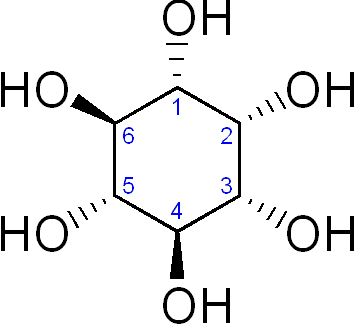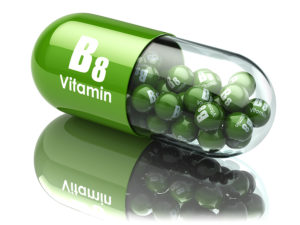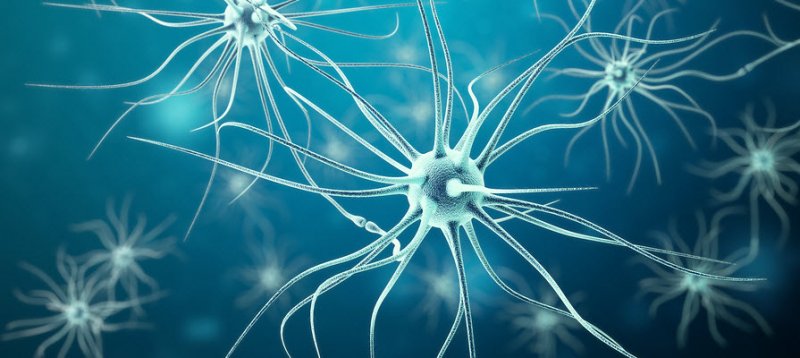Table of Contents
Vitamin B8 (Inositol) is a sugar alcohol and isomer of glucose. As a nootropic, inositol is involved in brain cell signaling, and is a component of cell membranes.
Vitamin B8 is no longer considered a ‘true’ B-Vitamin because your body can make inositol on its own. A “true vitamin” is either essential for life and/or cannot be made by the human body. So inositol no longer qualifies.
Inositol is used in your brain as a “secondary messenger”. It facilitates communication between brain cells. All of your major neurotransmitters need inositol to relay messages.
Inositol is also a component making up the phospholipid ‘shell’ encasing each brain cell. Once again, inositol acts as a messenger of sorts by assisting in the transport of amino acids, proteins and neurotransmitters across and into the brain cell.
Inositol is a ‘group’ of 9 molecules called ‘stereoisomers’. Myo-inositol is the most abundant stereoisomer, making up 90-95% of the total free inositol in your body.
As a nootropic, Vitamin B8 (Inositol) can be used to treat panic attacks and anxiety, depression, Obsessive Compulsive Disorder (OCD), bulimia, depression in bipolar disorder and mood swings.
Vitamin B8 (Inositol) helps:
- Brain Optimization: Inositol helps boost serotonin and dopamine receptor density. Improving the effectiveness of serotonin, GABA, glutamate and dopamine neurotransmitters in your brain.
- Neurotransmitters: Inositol improves the effectiveness of major neurotransmitters in your brain. Boosting alertness, concentration, focus, motivation and memory.
- Mood: Inositol is often used along with popular antidepressant medications improving their effectiveness. Or sometimes even replacing SSRI’s in the treatment of depression, anxiety, panic attacks and OCD.
What is Inositol?
Vitamin B8 (Inositol, cyclohexanehexol) is a sugar alcohol and isomer of glucose found in nearly all animals and plants.
Inositol is a group of 9 molecules called stereoisomers. In this article we’re talking primarily about myo-inositol which accounts for up to 95% of the inositol in your body.

Vitamin B8 is no longer considered a ‘true’ vitamin because our body makes inositol. And we can get it from most types of food.
Myo-inositol is involved in cell-signaling. In the simplest terms, myo-inositol hears from the first neuron that it’s about to fire over a neurotransmitter. And passes that information on to the receiving neuron. Not enough inositol and the neurotransmitter can’t do its job.
Inositol is one busy molecule in your body:
- Myo-inositol affects mRNA which regulates cell volume.[i]
- Phosphatidylinositol signaling pathways control signals inside and outside of brain cells.[ii]
- Inositol plays a role in DNA repair[iii]
- Inositol affects long-term potentiation[iv]
- Myo-inositol is a component of cell membranes
- Myo-inositol regulates cell metabolism
- Myo-inositol regulates cell energy consumption
How does Vitamin B8 (Inositol) work in the Brain?
Vitamin B8 (Inositol) boosts brain health and function in several ways. But two in particular stand out.
- Inositol influences neuroplasticity and neurotransmitters. Transcranial Direct Current Stimulation (tDCS) has been used to treat depression, Parkinson’s Disease, stroke and pain. But the maximum effect of tDCS in the brain was not until several minutes after treatment. Which indicates the effects of tDCS is not by direct neurotransmitter action like you would expect for example if you were using a nootropic.[v]
Researchers concluded the effect of tDCS was best explained by the activation of a ‘secondary messenger system’, and modulation of brain cell membrane proteins.
Neurotransmitters, neuromodulators and hormones have been shown to exert their action via an intracellular (inside the cell) secondary messenger system in which the activated neuroreceptor stimulates the turnover of inositol phospholipids.[vi]
Clinical studies have found that low levels of inositol are present in patients with anorexia, brain disorders and depression.[vii] And abnormal levels of myo-inositol in middle-aged adults can signal the initial stages of cognitive decline such as Alzheimer’s and dementia.[viii]
- Inositol helps reduce anxiety and depression. Long-term potentiation needed for encoding long-term memories, and long-term depression, rely on neural signal transmission and synaptic plasticity. And both are strongly influenced by the myo-inositol and phosphoinositide pathway.[ix]
A meta-analysis and systematic review of clinical studies were evaluated comparing inositol for depression and anxiety disorders. The researchers concluded that inositol was beneficial for treating depression and anxiety.[x]
How things go bad
Inositol is an important component of brain cell membranes. And is critical as a secondary messenger for both intra- and extra-cellular signaling.
 Low inositol levels have been found in those with major depressive disorder, Alzheimer’s, Parkinson’s and other neurodegenerative diseases. Science does not yet know if low inositol is a result of, or contributes to these diseases.
Low inositol levels have been found in those with major depressive disorder, Alzheimer’s, Parkinson’s and other neurodegenerative diseases. Science does not yet know if low inositol is a result of, or contributes to these diseases.
↓ Inositol levels decline
↓ Serotonin and dopamine receptor density declines
↓ Anxiety and depression get worse
↓ Concentration, cognition and memory decline
↑ LDL-cholesterol (bad) and triglycerides increase
↓ HDL-cholesterol (good) levels decline
↑ Inflammation and oxidative stress damage neurons
Vitamin B8 supplementation can help increase the density of serotonin and dopamine receptors in your brain. And improve neurotransmitter signaling. Helping you to cope with stress, lessen depression and improve memory.
Vitamin B8 (Inositol) Benefits
Myo-inositol enhances serotonin neuroreceptor sensitivity.[xi] And several studies have proposed a SSRI-like role for myo-inositol. Researchers believe inositol works as a SSRI because it is a secondary messenger of serotonin.
In other words, inositol gets a message from the 1st neuron that says it wants to send over a serotonin molecule. Inositol picks up that message and lets the receiving neuroreceptor know there’s an incoming serotonin molecule. Serotonin signaling is fixed and depression goes away.[xii]
In some regions of your brain, serotonin acts more like a “neuromodulator” rather than a “classic” neurotransmitter. And can affect glutamate and GABA as well.[xiii]
As a secondary messenger, inositol is an integral part of neuroplasticity and neurotransmitter signaling. Affecting anxiety, alertness, concentration, cognition, depression and all forms of memory.
A large percentage of patients do not respond to SSRI’s when used to treat depression or anxiety. The problem could be depression not related to serotonin or GABA deficiency (they could have a dopamine problem instead).
But if it is serotonin-related depression and there is no response to SSRI’s, inositol may help. Myo-inositol helps relay the messages sent and received by serotonin receptors.
Another problem with SSRI’s like lithium is Serotonin Syndrome. Too much serotonin can be released in the brain which can be toxic and deadly. Or the SSRI can deplete stores of inositol which raises serotonin levels too high.
Once again, inositol comes to the rescue. Researchers found that myo-inositol + lithium alleviated Serotonin Syndrome.[xiv]
Myo-inositol regulates blood sodium levels which helps in the maintenance of healthy myelin sheaths that protect neurons.
Myo-inositol protects your brain from a leaky blood-brain barrier that if left unchecked, would allow toxins produced in your liver to enter your brain.[xv]
Inositol can relieve anxiety and Obsessive-Compulsive Disorder (OCD). Myo-inositol can reduce panic attacks. And inositol can reduce mood swings.
Studies show that inositol is as effective as SSRI’s in treating the symptoms of bulimia and binge eating.[xvi]
Inositol can protect against lung cancer caused by smoking.[xvii]
Myo-inositol increases sperm concentration, total sperm count, and re-balanced follicle stimulating hormone and luteinizing hormone in infertile males.[xviii]
Myo-inositol can help lower LDL-cholesterol (bad-cholesterol), C-reactive protein and blood glucose levels while increasing HDL-cholesterol (good cholesterol).[xix]
Inositol reduces inflammation. Phosphatidylinositol reduces pro-inflammatory cytokines.[xx] And D-chiro-inositol decreases the mRNA expression and secretion of tumor necrosis factor-α, interleukin 6 (IL-6).[xxi]
D-chiro-inositol has anti-aging properties and can extend lifespan.[xxii]
The bottom-line is inositol is a potent pseudo-vitamin and can be a great compliment to any nootropic stack.
How does Vitamin B8 (Inositol) feel?
Inositol makes it easier to fall asleep. Unlike other sleep-inducing nootropics or sleep meds, it doesn’t “knock you out”. Falling asleep is just effortless.
Inositol increases serotonin and dopamine receptor densities. So damage that you may have done to dopamine receptors are repaired (particularly an issue with ADHD stimulant meds). And serotonin is simply more effective. Anxiety decreases, motivation goes up and depression goes away.
Inositol is great for social occasions because social anxiety levels decrease. In fact, inositol outperformed fluoxetine (Prozac®) at reducing panic attacks and can become effective in just a few days. With no side effects.
Some neurohackers feel that supplementing with inositol is the best anti-depressant they’ve every used. The real beauty of inositol is you can safely combine it with the current antidepressant (i.e. SSRI) medication you currently take. Your antidepressant meds may work better!
Inositol is a proven remedy for treating the symptoms of Obsessive-Compulsive Disorder (OCD). You should feel a noticeable reduction in negative thoughts. Some things just won’t bother you as much. And won’t dominate your thoughts so easily.
And inositol is an effective method of taming panic attacks.
Vitamin B8 (Inositol) Clinical Research
Inositol to Treat Panic Attacks
Estimates are that only about 70% of patients respond to standard drug treatments for panic disorder. And many often discontinue the drugs because of negative side effects.
Israeli researchers decided to compare inositol with the SSRI fluvoxamine (Luvox®) for panic disorder. In this double-blind, controlled, random-order crossover study 20 patients completed 1 month of 18 grams per day of inositol and 1 month of 150 mg per day of fluvoxamine.
In the first month, inositol reduced the number of panic attacks per week by 4 compared to only 2.4 for fluvoxamine. Nausea and fatigue were noted with those using Luvox® but not with inositol.
The natural compound inositol was more effective than a SSRI for treating panic disorder.[xxiii]
Vitamin B8 (Inositol) for Depression
A study published in the American Journal of Psychiatry noted that levels of inositol in depressed patients were lower than normal. In this trial, the authors administered 12 grams per day of inositol or a placebo to depressed patients for 4 weeks.
The overall improvement in depression scores was significantly greater than placebo by week 4. And no side effects were noted.
The researchers commented that “this is the first time a precursor strategy for a secondary messenger rather a neurotransmitter” was used in treating depression.
The authors concluded that “inositol had a significant antidepressant effect”.[xxiv]
Another study tried using inositol to treat Premenstrual Dysphoric Disorder (PMDD). PMDD is a particularly nasty form of PMS. It’s a condition in which a woman has severe depression, irritability and tension before menstruation.
Scientists don’t really know what causes PMDD except it has something to do with serotonin. Serotonin is the “calming neurotransmitter”. When it fails for any reason you get depressed, irritable, obsessive, negative and worried.
In this 2-phase clinical trial, PMDD patients were given myo-inositol in powder form, or a soft-gel capsule equivalent to 2 grams of myo-inositol.
The results showed a significant improvement on 3 different scales of measuring depression. Inositol significantly improved PMDD and associated depression, irritability and tension.[xxv]
Vitamin B8 (Inositol) for OCD
Inositol is good for treating Obsessive-Compulsive Disorder (OCD). OCD is a type of anxiety characterized by unwanted, recurring thoughts and behaviors.
One double-blind, controlled crossover trial treated 13 OCD patients with 18 grams per day of inositol for 6 weeks.
The OCD patients had significantly lower scores on the Yale-Brown Obsessive Compulsive Scale when taking inositol than when taking placebo.
The authors concluded that “inositol is effective in depression, panic, and obsessive-compulsive disorder, a spectrum of disorders responsive to selective serotonin reuptake inhibitors (SSRI’s)”.[xxvi]
Vitamin B8 (Inositol) Recommended Dosage
Recommended dosage for inositol is up to 3 grams per day. Typically split into 3-doses of 1 gram each. One in the morning, one at noon, and your final dose before bedtime.
Clinically effective dosage for depression and anxiety is up to 12 grams per day. Split your dose into 3-times per day. 4 grams in the morning, 4 grams at noon and 4 grams prior to bedtime.
Clinically effective dosage for OCD is up to 18 grams per day. Split into 3 equal doses of 6 grams each.
The clinical dosages mentioned here are the ones used in clinical trials. Most people experienced relief of symptoms within 3 months. Some people showed improvements within a week or sooner.
Important note: It may not be necessary for you to go as high as 12 or 18 grams per day. Inositol could be just as effective for you in much smaller doses.
Most neurohackers notice benefits when taking 3 – 4 grams per day or less.
Vitamin B8 (Inositol) Side Effects
Vitamin B8 (Inositol) is non-toxic. So is considered well-tolerated and safe.
Higher doses like those used in clinical trials could result in flatulence, stomach upset, nausea, diarrhea, increased mood swings for bipolar or psychosis patients.
If you’ve been diagnosed with bipolar or bipolar-spectrum disorder, please consult a pharmacist or your doctor before using inositol.
Studies have shown and neurohackers verify that inositol supplementation may reduce testosterone levels and libido. Most of the Low-T reports were by woman but I’ve heard a few men reporting Low-T and libido from inositol as well.
Types of Vitamin B8 (Inositol) to Buy
Inositol is available in capsules, softgels, and in powder form.
Inositol powder is the least expensive way to supplement with this nootropic. Inositol is basically a sugar so it tastes sweet. Not as sweet as sugar but it tastes good on its own. Or mixed in your favorite beverage.
Lecithin is comprised of both inositol and choline. So lecithin as a supplement will provide you with inositol.
Inositol is often supplied by supplement manufacturers as “inositol + choline”. The thinking behind this combined supplement is that inositol compliments the effects of choline.
When inositol and choline are used together, they are supposed to improve nerve function and help you metabolize cholesterol.
The combination of Myo-Inositol & D-Chiro Inositol is often marketed to women who are dealing with Polycystic ovary syndrome (PCOS).
But high doses of choline can leave you depressed and sleepy. So if you want to add inositol to your nootropic stack, I suggest you avoid the combination and go with straight inositol.
Some multivitamins also include some form of Vitamin B8 (Inositol) in their formula. But many of these multis don’t contain enough for optimum health. And many have an isolated or synthetic version of this nutrient.
The Click for Performance Lab® Multi offers a nature-identical form of Vitamin B8 (Inositol) and is now my favorite daily multivitamin/mineral supplement.
I prefer the Performance Lab® multi because it’s more potent, it’s biologically active and I’ve found to be a far more effective multi compared to every other multivitamin supplement I’ve ever used.
Performance Lab® uses their own priority NutriGenesis® vitamins and minerals which are grown on probiotic, plant and yeast cultures in a state-of-the-art lab.
Nootropics Expert Recommendation
Vitamin B8 (Inositol) up to 3 grams per day
 I recommend using Vitamin B8 (Inositol) as a nootropic supplement.
I recommend using Vitamin B8 (Inositol) as a nootropic supplement.
Your body does make Vitamin B8 on its own. And you get it from food. So it is unlikely that you are inositol deficient. But if you want to try inositol for its anti-anxiety and antidepressant benefits, you must take it as a supplement.
Inositol is especially helpful for those suffering from anxiety, depression, panic attacks, or OCD.
Experience shows Inositol helps stop and reverse the symptoms associated with high cholesterol levels. B8 will lower ‘bad’ LDL-cholesterol as well as raise ‘good” HDL-cholesterol.
Vitamin B8 is also particularly helpful to quell anxiety caused by social situations.
Vitamin B8 can help you get a good night’s sleep. Many find it more effective than sleep meds and other nootropics used for sleep. You’ll awaken feeling refreshed and calm. Ready to start your day.
The recommended dosage of Vitamin B8 (Inositol) is up to 3 grams per day. But start at a gram or less, and work your way up depending on how you feel. Clinical doses of 12 or 18 gram are usually not needed for most people.
At the very minimum every neurohacker should be using a multivitamin every day that includes Vitamin B8 (Inositol). The best multi I’ve found and use every day is the Click for Performance Lab® Multi for men or women.










Join The Discussion - 213 comments
Alexa
October 2, 2019
Hello. What do you think about this?
https://www.ncbi.nlm.nih.gov/m/pubmed/25341532
Increased myo-inositol level in dorsolateral prefrontal cortex in migraine patients with major depression.
If inositol can help depression, why does it show that it’s increased in migraine patients with major depression?
David Tomen
October 3, 2019
Alexa, this is getting into an area of neuroscience that’s beyond my level of understanding. So far at least. It appears in this study that inositol just happens to be present in this small brain region in those who suffer migraines and may have major depressive disorder. But it doesn’t discount the fact that inositol helps those with depression.
Matthew
September 28, 2019
Hi David,
I was wondering if it would be possible to take inositol and tryptophan in the same day?
Also, what would you recommend if you experience low libido while taking inositol?
Thank you!
Matthew
David Tomen
September 28, 2019
Matthew, you can safely combine Inositol with SSRIs so should be OK with L-Tryptophan. It increases serotonin receptor density but not serotonin itself.
And studies have shown and neurohackers verify that Inositol supplementation may reduce testosterone levels and libido. Mostly in women but some men report this as well. If that’s a side effect you’d like to avoid then you shouldn’t use Inositol.
John
December 30, 2020
Hi David,
I have added inositol to my stack for social anxiety and it does works wonders. I use it with gotukola amongst other racetams and it really helps relieve me of my anxiety. I feel normal and it’s a great feeling. The only issue is that it really lowers my libido. I was wondering if there was any other supplement that had a similar effect to inositol that you know of but doesn’t reduce sex drive?
Thanks for all your help, John.
David Tomen
December 30, 2020
John, Inositol is unique in so many ways. There is nothing that I can directly compare it to. Effects on libido is a well known side effect of Inositol but does not happen to everyone who uses it.
The only supplement that may help is SAM-e. It certainly is not a direct swap or replacement. But is the closest I can think of.
John
December 30, 2020
Thanks for the feedback David. I’ve had SAMe in my stack before and it wasn’t very effective for me. Felt an almost burning over stimulating sensation.
I suppose ill use the break to focus more on meditation , diet and exercise.
Have a good one!
David Tomen
December 31, 2020
John, let me know if you need any more help with anxiety. Because there are so many options available.
I wish you the best as well.
Dewayne
July 9, 2019
Hello David,
How exactly does inositol interact with GABA and Glutamate? I’ve read somewhere that it lowers Glutamate levels. Can you please provide a little more clarity with this? Thank you
David Tomen
July 10, 2019
Dewayne, Inositol boosts the effectiveness of GABA and Glutamate already in your system. https://www.ncbi.nlm.nih.gov/pmc/articles/PMC2430669/
Dewayne
July 11, 2019
Ok, would you happen to know of any supplements that could help lower glutamate? That was actually my intent behind my research on inositol.
Thanks,
Dewayne
David Tomen
July 11, 2019
Dewayne, the simple answer is GABA. But the long answer is best explained by Dr. Nancy Mullan in this post: http://www.rlcure.com/glutamate2.html
Maureen A.
June 29, 2019
I have been taking 12 grams of inositol daily at bedtime as part of a treatment plan for anxiety and depression. (This has been with the blessing of my MD.) It has been helping, for sure. I don’t want to stay on such a high dose forever. Do you have ideas or places to read up on gently and slowly reducing dosage for anxiety/ depression? I need to cut my supplement expenses down, but I’m worried about symptoms getting worse if I go too fast.
Thank you for any suggestions!
David Tomen
July 2, 2019
Maureen, most people notice the benefits of Inositol with 3 – 4 grams per day. Maybe with the blessing of your MD you could try reducing your dose by a couple of grams every week or so until you get down to that level.
If you slowly and methodically reduce your dosage over time you’ll notice when you’re no longer getting the benefit. And will know to increase by a couple of grams if you need to.
Hilal yurdusever
June 4, 2019
Hi david.it was useful. I knew them before and I used inositol breastfeeding and work I was good. Butit didn’t work only when I changed the brand. then froze to the old brand and start working again. I was getting 15 g and I was fine but after a few months the ocd and panic froze back. I increased the dose of 18_20 gr made a sure gene good again after a few months. 18-20 g inositol also stopped working. and I did not leave inositol unfortunately. I cut the breastfeeding and started with fluoksetine dr advice. Why did inositol leave work? and would you recommend using ssri and inositol together? Or another advice for me. Thank you very much david
David Tomen
June 5, 2019
Hilal, 3 grams for day maximum is recommended for long-term use. I have no evidence of this but chances are you grew tolerant to Inositol at such high doses.
There have been clinical trials that showed reasonable dosages of Inositol increased the efficacy of some antidepressants.
Bry
March 3, 2019
Hello. I have been suffering from OCD and intrusive thoughts for over 20 years on and off, mainly when I get stressed. A trigger. I was taking inositol for a few weeks and started to feel better but my doctor put me on 50mg of Sertraline HCL. It says on the Insitol container not to take it when taking a SSRI. Any reason why?
David Tomen
March 4, 2019
Bry, likely because Sertraline is a SSRI (https://en.wikipedia.org/wiki/Sertraline#Pharmacology). And inositol boosts the density of serotonin receptors. Theoretically, the combination of the two could cause Serotonin Syndrome. But one study found that the combo of Inositol and Lithium prevented Serotonin Syndrome (https://www.ncbi.nlm.nih.gov/pubmed/7617810).
I suggest you get familiar with the symptoms of Serotonin Syndrome so you know what to watch out for. If you want to continue using Inositol, stack it with Lithium Orotate: https://nootropicsexpert.com/lithium-orotate/
Kelly
March 29, 2020
Hello,
A bit confused…I thought that Inositol didn’t play a part in seratonin syndrome. Would one have to avoid cold meds, other supplements that affect seratonin, the occasional 1 or 2 glasses of wine with inositol just like with SSRIs?
David Tomen
March 30, 2020
Kelly, see my other reply to your question. Inositol does not directly increase serotonin. It increases the density of serotonin receptors which helps make serotonin more effective.
Kevin
October 25, 2018
Dude, thank you so much for this article. I have been working non-stop for the past 6 months experimenting with nootropics and other options to cure my mental illnesses.
4 grams of sunflower lecithin last night provided me the relief I have been seeking for a long time. I combine that with 4 grams of glycine and I get incredibly wonderful sleep and actually sleep through the night.
I have tried many experimental nootropics that always had some side effects, but the lecithin (inositol+choline), took care of almost all my symptoms in one fell swoop.
I appreciate your insight here because it backs up nearly everything I was sending about this molecule.
Thanks,
hello
October 19, 2018
Hello David,
I see inositol works great for anxiety. Literally stop physical symptoms of anxiety and also some mental sysmptoms. But it makes me very tired. Do you know why ? What should I do about that tiredness ?
Same thing L theanine calms me good but cause more urination with it and also tiredness (less than inositol). Inositol can make dull feeling all day. Any input will be appreciated. thanks.
David Tomen
October 21, 2018
Inositol influences serotonin receptor sensitivity and affects glutamate and GABA. High levels of any of there neurotransmitters will likely cause fatigue.
If you are getting your L-Theanine from green tea it could be that the low levels of caffeine are irritating your bladder.